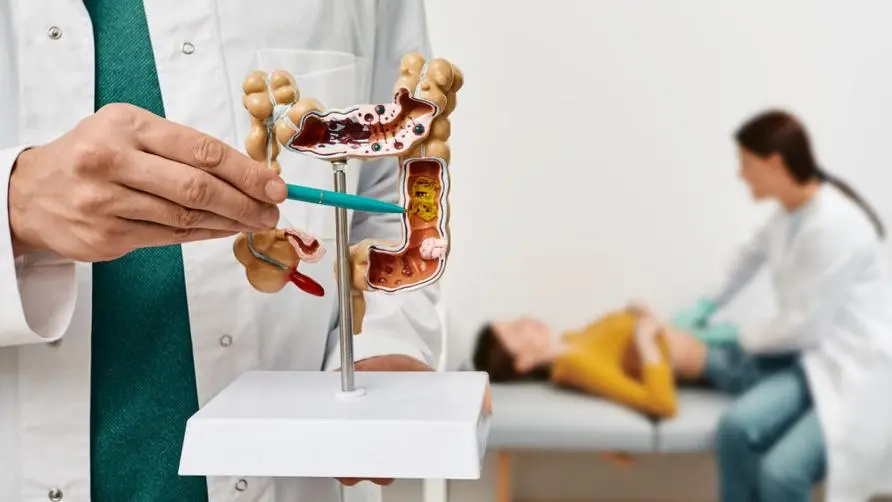A woman went to the emergency room with stomach pain and lost 10 kilograms. She was diagnosed with metastatic colorectal cancer before she was 40 years old! Precise dual-target treatment may save lives

After suffering stomach pain and going to the emergency room for 2 and a half months, he lost 10 kilograms and it turned out to be metastatic colorectal cancer.
For many years, colorectal cancer has ranked among the top two most common cancers among Taiwanese people. And young people who develop colorectal cancer are more likely to face high malignant gene mutations and recurrence risks? A 38-year-old woman surnamed Hong sought medical treatment for severe stomach pain three years ago. She was in and out of the emergency room repeatedly and hospitalized for nearly two and a half months. She lost 10 kilograms in a short period of time. After surgery, he was diagnosed with stage III colorectal cancer with a highly malignant “BRAF” gene mutation. It recurred and even metastasized to the ovaries only half a year after treatment.
The female patient surnamed Hong pointed out that the cause of the disease could not be found after various examinations, including computerized tomography, and she actively requested laparotomy because colonoscopy was not possible due to intestinal obstruction. Only then was a tumor discovered on the right side of the large intestine, which had progressed to the third stage. . Although she survived 12 subsequent rounds of chemotherapy, the highly malignant BRAF gene mutation caused the cancer to relapse six months later. In order to defeat the disease, she decided to have her uterus and ovaries surgically removed.
Most symptoms of colorectal cancer require medical treatment only when the symptoms are already in the third or fourth stage.
Dr. Chen Ziliang, Dean of the Hsinchu Affiliated Hospital of China Medical University and Department of Colorectal and Anal Surgery, Department of Surgery, pointed out that colorectal cancer is a “quiet” cancer with no obvious early symptoms and symptoms vary slightly depending on the location of the disease. The left side (distal large intestine) is prone to intestinal obstruction, changes in defecation habits, bloody stools, etc.; the right side (proximal large intestine) has more feces and a wider diameter, so symptoms are more likely to be ignored. Clinical observation has found that if people seek medical treatment after symptoms occur, the diagnosis is often in the third or even fourth stage.
Dr. Chen Ziliang said that currently, one in four people with colorectal cancer still has stage 4 metastatic colorectal cancer when diagnosed. After progression from stage 3 to stage 4, the five-year survival rate drops significantly from 71% to 71%. 15%, on average only two out of every 13 people survive more than 5 years.
In order to improve the cure rate of colorectal cancer, people over 50 years old should make good use of fecal occult blood tests every two years. High-risk groups with a family history are recommended to undergo colonoscopy as early as possible. Even if metastatic colorectal cancer is diagnosed, there is still a chance to extend survival through genetic testing and more advanced targeted therapies.
Further reading: The population of colorectal cancer in this region ranks first in Taiwan! Nutritionist warns: Stop eating “8 foods” to feed cancer cells
Precise dual-target treatment of highly malignant BRAF gene mutations is expected to save lives
Dr. Liang Yi-hsin, Department of Oncology, National Taiwan University School of Medicine, said that for metastatic colorectal cancer, personalized treatment is an important drug strategy to extend survival time, especially through genetic testing to confirm the use of target drugs. If there are economic considerations Priority is recommended to detect the four genes for which drugs are available: BRAF, RAS (KRAS and NRAS), MSI, and HER2. Genetic testing not only provides guidance for drug selection, but also serves as a predictor of prognosis. For example, BRAF gene mutations often cause rapid disease progression, easy peritoneal metastasis, high drug resistance, and high recurrence rates.
Dr. Liang Yixin pointed out that for metastatic colorectal cancer with BRAF mutations, dual-target drug relay treatment can be used after the first-line treatment worsens. Studies have shown that 75% of patients can effectively control the disease progression, and the probability of complete tumor disappearance has increased from 2%. increased to 19%. At the same time, dual-target therapy can help BRAF-mutated metastatic colorectal cancer increase the survival time by 75% and reduce the risk of death by 39%, breaking through the previous treatment dilemma of often less than half a year from deterioration to death.
Dr. Wang Zhaoyuan, director of the Chung Ho Memorial Hospital of Kaohsiung Medical University, said that patients with BRAF gene mutations are in urgent need of breakthrough treatments to “save their lives.” However, currently, the national health insurance has not yet opened to cover dual-target drugs for BRAF, and the high out-of-pocket burden may eliminate patients’ only Even if the condition improves, the drug may still be discontinued. We hope that the competent authorities will listen to the voices of cancer patients and allow patients with BRAF gene mutations to receive health insurance resources and obtain a better quality of life.
Extended reading: Will the colorectal cancer population surge in 2023? Experts reveal “1 reason” that makes people ignore it: the diagnosis is already in the fourth stage





